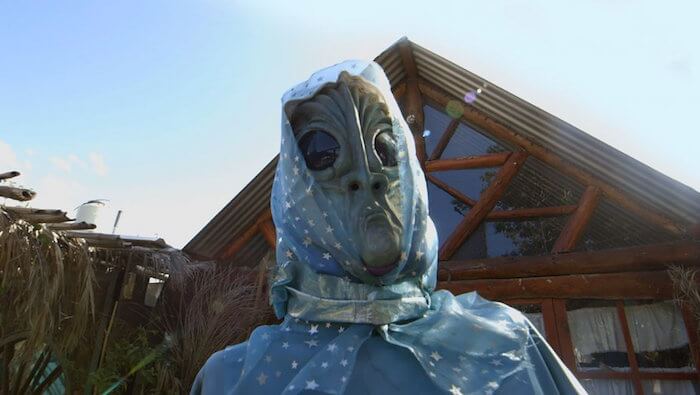Jacqueline (Argentine): Is There Still Such a Thing as a Good Movie?


Directed by Bernardo Britto
Opens October 21 on VOD and at Syndicated
What does it mean when “anyone can make a movie” is a truism and “so bad it’s good” is regarded as a worthwhile notion? That’s the question at the heart of Bernando Britto’s mockumentary Jacqueline (Argentine), in which a filmmaker is contacted by a low-level member of a French intelligence agency taking refuge in Argentina, who claims to have information regarding a plot to assassinate a presidential candidate in a fictional Arab nation. The film garnered some attention at this year’s Sundance Film Festival for its kooky plot and approach, but those are gilded surfaces, as it is ultimately more of a Rorschach Test than an argument or exploration of the realities that inform it.
Britto goes out of his way to assure us that the unnamed documentarian (Wyatt Cenac) is a poor director, thereby inuring himself from critiques of the needlessly shaky camera, ostentatious zooms and poor framing. As the crew begins filming, Jacqueline presents little evidence to support her case, leaving the filmmakers with precious little to work with and a growing belief—suspected from the start—that the whole thing is a sham. Mixed in with this investigation of Jacqueline and her conspiracy is a recurring plot of stray dogs that are dropping dead and encounters with some of the fellow inhabitants of Jacqueline’s remote mountain community and its nearest town—all of which, again, may or may not be connected. Thanks to a voiceover that presages everything a moment before it occurs, this conspiracy takes a backseat to the director-within-the-film’s attempt to make a worthwhile movie where there may not be one.
Tying these threads together is the owner of the store where they buy cameras, a man who owns 20,000 movies and makes up a list of “classics” that these filmmakers absolutely just must see. The titles, we learn, include Norbit and White Chicks, the latter of which is described as “great,” “awful,” and “so bad it’s good” in the span of ten seconds. Jacqueline (Argentine)’s larger search for meaning finds a receptive agent in this character, whose presence seems to argue that all movies will at least be seen by someone willing to claim it as worthwhile regardless of quality.
Such an observation is timely in today’s discourse, in which films maudits seem to be “reclaimed” daily and the number of films yet to be earnestly called a “masterpiece” is quickly dwindling toward double-digits. But a timely observation is one thing and a worthwhile insight is another; there is precious little interrogation in Jacqueline. It is content simply to replicate this reality, capitalize on it, and implicitly endorse it through its own self-conscious, protective qualities. There is a nascent parallel between the director in the film and Jacqueline, both looking for a purpose where there may not be one, but postmodernists have played with the meaning of meaninglessness and vice-versa for decades, while the “cult film” adored for its badness is scarcely newer. Jacqueline is addressing each phenomenon in the age of “anyone can make a movie” and embodies that reality within the narrative, but it is too myopic to address larger aesthetic and philosophical implications or connect these trends in the way the social/cinematic moment seems to demand. The revelation, not so much the film’s as something its mere existence proves, is that protection from being called “bad” is treated as more virtuous than striving to be called “good.”
You might also like 




















